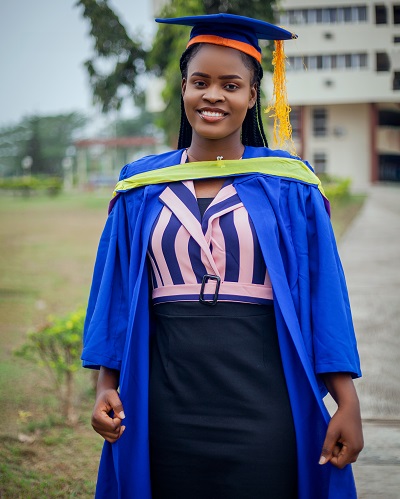Here is the second part of the series of interviews with recent graduates of the Federal University of Technology, Akure. They are some of the 2020/21 set of the university and were executives in their various fellowship groups while on campus.
They all spent two extra years on campus because of Covid-19 and the ASUU strike. The joy however is that they all graduated with First Class.
Seven of them were interviewed in the first part published on this site.
Those whose stories are told here include Olanike Odofin, Elizabeth Adeleye, Seun Akinrinde, Joshua Awodiya, Esther Obadero, Rachael Haruna, and Thankgod Ihesie
Odofin Oluwatimilehin Olanike: It’s not enough to set goals
Soft spoken Olanike Odofin was the coordinator of the Academic Counselling Unit of RCF at FUTA. She studied Animal Production and health in FUTA School of Agriculture and Agricultural Technology. An indigene of Igbaraoke Ondo State, Odofin said she knew she would come out with a First Class from day one. “Before I got admission to FUTA I knew I would get a first class. I had this note where I wrote 4. 60 as the expected CPGA for my first year and I ended up having 4.61 in that year.”
On the source of her confidence, she says, “I think it is about being sure of the kind of person you are. I knew whatever I put my mind to do I would achieve. I had teachers who opened my mind and encouraged me to pursue excellence. Above all, I serve God who supports hard work. So there was no reason to get below expectation.”
She explains further that it is not just about setting goals, you have to work towards it. “There was consistency and dedication that went to it. I told God I did not want to finish with what I started with and it became a reality. I came out with a CPGA of 4.63.
Recalling that she lost her father when she was in her 400 level, Odofin said, “I will say it’s God’s mercy that made me make it at last. My father was sick throughout my stay at the university. It was emotionally traumatizing for us in the family. He passed on eventually. But we still have cause to thank God.”
Her mother also played a pivotal role in encouraging her and supporting her throughout her stay in FUTA. The challenging time for her apart from when she lost her father was when she put in all the efforts and ended up with a grade below expectation in one of the semesters.
She described the RCF as a family“It was a home for me. When I was in 100 level I could see the trajectory of success in the fellowship. The alumni body has a clear footprint that one could follow. You are motivated by those who have gone ahead.”
The unique thing about Odofin is that she does not follow a regular reading pattern. “I read alone. I maximise my time. I read in the library.” she said.
She also does not enjoy reading books online because of the attendant distraction. She prefers to write out the e-version of her note. “I write out my handout in my note. I prefer reading my writing. I use different pens to copy out notes. I start reading very early in the semester so that I won’t be under pressure during exams period.”
Odofin also says she only goes for tutorials when the exams are approaching. She says she has learnt the value of socialising. “Interact with people. Your life should not just be about books. In my 100 level, I was keeping to myself. But by the time I got to the 300 level, I began to see the value of socialising.”
On her counsel to undergraduates, she says, “Know what you want and go for it. Don’t just accept anything that goes. Have a vision for yourself. Let your vision be clear so that you can refer to it. But above all, work towards it”
Kehinde Adeleye: My mum’s death at my 500 level almost set me back
Owo, Ondo State-born Kehinde Adeleye served in the academic and counseling unit of RCF. She studied Micro Biology and was among the five students who made First Class in that department.
She joined FUTA through direct entry. But the first shock she got was that many of the supposedly brilliant students avoided her when she requested to learn from them. “When I joined FUTA, I went to the gurus in class so we could read together. They all gave me excuses.
“They also refused to give out notes of some part-one courses that I had to take since I joined as a direct entry student. So, I had to struggle alone as a part two student in a new environment. God helped me I started with a CPGA of 4.19 which for me was encouraging.”
She joined the workforce of RCF in the second semester of part 2 and also got involved with the choir. She was always in fellowship throughout the week for one activity or the other.
But then, she noted that the time she spent reading was always productive. “Many of my friends wondered how I was able to excel despite my deep devotion to church events. What I can say is that God granted me speed. I understand what I read easily.”
She had a lot of challenges while in school. Before she got admission she had to work for about two years at one of the outlets of Mr Biggs in Lagos. It was the money she got from working along with the support from her parents that helped her in the first year in school.
While in school, she embarked on some other businesses to keep herself and pay bills. It was tough going through school. What further complicated her ordeal was the death of her mother when she was in her final year.
That occurrence devastated her. And it looked as if her dream of a first-class degree would no longer be a reality. “When my mum died, everything came crashing on me. She was just 50 years old. She died on November 30, 2022. I had seminars, and projects around that time. The devil did not want me to have a First Class.”
She said her mother was one of the reasons she studied hard so she could make her proud. “My mother had been passionate about the prospect of me making a First Class. But when she died, I lost momentum. I would read for a test and forget what I read and still had to write the exams. A lecturer called me and was wondering if I was the one who wrote a particular test. But in the end, I still made it.”
She stated that her stay in FUTA has taught her to put God first always. “God is the one that multiplies the little time that we have and also makes it productive.”
Even at that, she believes it’s important to put in one’s best in whatever one is doing. “People don’t want to listen to excuses they want to see results. It is sweeter if you say you succeed despite the challenges than to say challenges stopped you from succeeding”.
Seun Akinrinde Oluwaseyi: My parents’ prayers worked for me
A native of Imala, Abeokuta, Ogun State, Seun Akinrinde was one of the 23 students at the Department of Mechanical Engineering who made a First Class. There were 150 students in that department
He told Church Times that he had always envisaged making a First Class. “My parents had always emphasised to me the importance of finishing well. They influenced me a lot. My background academically has always been strong. When I came to the university I was to build on what I already had. It was a little bit less difficult.”
One of the important steps he took was to join the RCF. “I can also attribute my success to the fellowship. That family of elder brother and elder sister was instrumental to the success of members of the fellowship. They were able to guide us to study past questions and prepare well for exams”.
He was also strategic about the kind of friends he made. He chose the best. “I picked the best set of people and made them my role model. I was also able to strike a balance between church activities and school.”
He believes every student has a period of assimilation. “Assimilation could be faster during the day or night depending on how one has conditioned one’s mind. I always read every time I had the chance. I had study groups where we shared resources and materials. That helped a great deal”
Akinrnide who was the VP Church Growth of RCF said his set of mechanical engineering in FUTA was quite outstanding. “From our 100 level days, we were outstanding. The department produced the highest number of First Class the school had ever seen. More than 60 percent of those with First Class were those who were active in their various fellowship groups. We call ourselves, Class of Elites.”
He said, “FUTA has taught me the importance of family. I got to understand the importance of walking with people of like minds. Moving forward in life I will be more intentional about my association.”
The school has also taught him a lesson in resilience “We were in school for seven years instead of five years. When all the stress came and we were tired, we were able to encourage ourselves.”
He said the role of his parents in his life can’t be overemphasised. “My parents called me every night in the first three years of my stay on campus to pray with me and counsel me. They always encouraged me to be focused. The support and love was massive.”
Going forward in his career, Akinrinde who is currently doing his NYSC in an engineering firm says, “I have picked interest in the energy sector. I look forward to pursuing a career in that direction.”
Awodiya Joshua Fifehanmi: I sometimes studied on a hungry stomach
He wanted to study Civil Engineering. But he got Ecotourism and wildlife management. He was in a quandary about the course and had issues coming to terms with it. But with time, he began to fall in love with it.
For Joshua Awodiya, who was one of the 8 students who made a First Class in his department, becoming a distinction student is all about determination and hard work.
“My parents are not financially buoyant. It was a real struggle to even get what to eat at times. But I had to carry on, trusting God for the best. There were days I read on a hungry stomach. I used to read for an average of six hours every day.” he said.
His uncle stepped in to help him when he realised he was in First Class. Some of his friends also came to his rescue. Some volunteered to buy handouts for him. That, to some extent, helped to ameliorate the pain of not having enough money.
He also made money from coaching some students and putting them through their assignments.
Awodiya said the secret of having a First Class starts with being inspired to work towards it and then knowing how to manage time. He said he was first inspired to work towards First Class in a tutorial class. He recalled, “The person taking the tutorial said, if you have the potential to graduate with a First Class and end up with a 2.1 you are a failure. You must not limit yourself. Go the extra mile to know more. That was what inspired me to aim high.
“I also discovered that time management is key.We don’t joke with time in the fellowship. My life was in a triangle- fellowship, school, and then my lodge. I had no social life”
He said night is the best time for him to read. “That is the best time for me to assimilate. I also handle tutorials. The more I teach people, the more I understand. I give time for fellowship and my studies. Nothing clashed. I respect my schedule.”
According to him, FUTA was a training ground. “I learnt hard work and reliance on God’s grace. I was the Bible study and academic coordinator in RCF. That position helped me to build myself. It helped me in public communication. It helped me to be confident and to be more committed to God.”
He counseled that any student who wants to make a First Class must shun all forms of distractions.
Obadero Omowunmi Esther: “I don’t like seeing people when I read” recalls how she got a “carry-over” by error
Esther Obadero is from Akoko, Ondo State. She was RCF Assistant Secretary while in FUTA. She studied Statistics and was one of the three students who made a First Class out of 68 students in that department.
She said, “Making First Class had always been my priority. But by the time I started working towards it, I discovered that it was not easy. I wanted to back out. During my 100 level, we were not doing departmental courses so I was not getting the result I expected.”
Clinching the minimum 4.5 for a First Class was like an endless journey. In her second semester part 2, she had a carry-over. But it turned out that there was an error in the recording of her mark. It was when she was about to re-register for the course that the error was detected by her HoD who was convinced she would have done better.
She explains, “In my part two, I was got a carryover. I was discouraged and felt like dumping the idea of making a First Class. But thank God for my HoD who followed up on my scores. He was the one who had to go and find out what happened. He requested for my script. The process took almost a year. He now found out that I got 75 in that course instead of the 35 I was given. That correction boosted my morale.”
She said she liked reading alone while in school. “ I like to read alone. I don’t like to see people around when I read. I usually read at night between 1 and 4 am. I read in my room. It was a rented apartment off campus.”
Obadero never went to parties. “I socialised in the fellowship. I am an introvert. I don’t fancy going out at all.”
She had the misfortune of losing her father when she was in her final year. “My father’s death was another drawback for me. But it did not affect my overall performance. But going through school was really hard. I had to do some jobs on campus to make money for myself. I was also a beneficiary of fellowship scholarship.”
She said the first lesson for her in FUTA is not to lean on your understanding. “God is the major factor in this journey. I saw how my friends read. When I compare that to mine, I am not supposed to have a higher grade than them. But somehow, God made it happen for me. I will forever be grateful to God.
“There is also the place of hard work and ability to manage time. “It used to be as if 24 hours was not enough. I had a daily timetable. I know my reading hour. Combining everything was tough. But we did all the same. FUTA brought me out of my shell. My communication skill has improved. I used to have this communication problem. I can now communicate very well.”
Rachael Abisola Haruna: It’s good to have a skill apart from excelling academically
Abisola Haruna is from Owo, Ondo State. She studied Crop, Soil, and Pest management. Her first year in FUTA was a bit difficult because that was the first time she would be stepping out of the comfort of her family.
She was not used to the hustle and bustle life. It was not easy balancing all the demands of school. But she had a strong conviction that all will end in praise. “I just had it settled in my heart that I would excel. Though I was not pleased with the course I was given I had to give it my all. I had to love the course so that I could do well in it. I discovered that it is related to biochemistry and that I could go into the research end of it.”
Haruna who graduated with a CPGA of 4.76 said with time she learnt how to balance fellowship activities with school life. “I was able to find out what works best for me. For instance, I didn’t like to read in school. I am also not a night person. I was doing that at the beginning. But I discovered I was not cut out for it. So, I started reading inside my room and it worked better. I used to read alone. Even if I don’t know something once I sit down with it, I will understand. I felt it was more of a distraction reading with people. But I revise what I have read with my friends.”
Haruna was in the choir and was the coordinator of the 100-level students when she was in her final year. She said the stress was too much for her to bear but that God supplied grace for her to trudge on. “Coupled with the academic stress was the lack of funds. There were times I did not have anything on me, no food, no money. But I just believed that the future would be better.”
One of the challenges she faced was her inability to read e-copies of her notes. She had to print out the notes and as a result, spent so much money. “Money for feeding was spent on printing hard copies of my note. Anytime I read with my phone I get distracted, I prefer reading hard copy.”
The support from the home front was also incredible. “They call, pray, and give me moral guidance and also encouraged me,” she said.
On the lessons she picked from FUTA, she said, “Nothing good comes easy. You have to strife for it. You have to put in your efforts to achieve success. Surround yourself with people of like minds. It is easier to go on the journey when you collaborate with others.”
While in school, her life oscillated around her house, fellowship, and school. She had no social life. “Most times I read to relax, I take a stroll to get rid of the stress of the day.”
Based on her experience in school she says, every student should learn to have a skill apart from excelling in their academics “It is better to have a skill at hand. You need a desk skill; something you can always fall back on. I am a data analyst apart from having a first degree in Crop, Soil, and Pest management. I earn money from my skill now”
ThankGod Ihesie Oluwadurotimi: You can be a first-class student without a first-class grade
ThankGod Ihesie is of mixed parentage. His father hails from Oguta Local Government Area in Imo State while his mother is from Osun State. He was quick to attribute his outstanding performance in FUTA to God’s mercy when Church Times spoke with him. He said, “I will describe my graduation and my result as a product of mercy”
He entered as a direct entry student having done the JUPEB programme in FUTA. He wrote the exams and scored 16 points. He had an A in Maths, an A in Physics, and an A in Chemistry. The result facilitated his direct entry to read Information Technology in FUTA. He turned out to be the best graduating student in that department in the 2020/21 set
But he said he was initially not obsessed with making a First Class “I desired to just enter the school, learn, and do my best. My mum always encouraged me to aim at making a First Class but that I should not compromise my godly values. That counsel guided me.”
Ihesie however noted that as an undergraduate, nobody would spoon-feed you. “What lecturers do is to give you 30 percent exposure to your course of study, the remaining 70 percent about the course is left to you. That means you have to read wide, consult books and all kinds of PDF files. It was challenging.” he said.
Though he did not know how to read at night he had to learn it because time was not on his side. “I read every day. I also tried to go through the topics we treated in class. I had to create the habit of reading at night to meet certain targets I gave to myself. But after reading for like 4 hours in the night I give my brain rest. But I don’t read in the night if I had not rested enough in the day.”
Despite the demand for his time in school, he also had to play the role of Evangelism Coordinator in the Foursquare Students Fellowship where he worshiped. “The God factor is very important. We did 10 courses in a semester and each of these courses has heavy materials. I enjoyed the grace of being able to read wide. The holy ghost also led me to where to read. Things became tougher being an exco in the fellowship. But we could not just afford to fail. I used to tell people to make sure they read so that we will not use God as an excuse for not doing well.”
The first challenge he had in FUTA was the unwelcoming attitude of his colleagues when he joined as a direct entry student. “I don’t know why, but direct entry students were more like a threat to those we met in the department. Their attitude towards us was not friendly. But that was soon sorted out. I also had an issue with my accommodation. I had issues with my health and all kinds of other challenges I can’t talk about now. But God saw me through”
One of the areas that he is ever grateful to God was how his needs were met in school. Though his parents are not rich, he got support from many quarters. “When I am in need, I will just go to God in prayers and people will call to bless me. God used one of my uncles greatly in this regard and so many other people.”
Currently doing his NYSC in Adamawa, Ihesie says he learnt to build a lot of trust and intimacy with the holy spirit. He once went blank in a particular exam but the holy spirit brought all he read to his remembrance.
He says further that there is no middle ground in the the university “It’s either you get closer to God or you’re far from him. You can’t be on the fence.”
While noting that many fail because they don’t have a sense of direction, he said, “ I saw people that were intelligent but did not get the result they expected. This could be a result of some factors they do not have control over. Students read for hours and still have a C. In that case, no one knows why. You can’t challenge your lecturers on your results. I also got grades I did not expect in some of my courses.”
He counseled that the best attitude is never to never to give up. “I tell people not to lose focus. You can set a target for yourself and work towards it. Make friends with people. Don’t look down on anybody. Don’t be moved by what people say. Don’t be discouraged by our educational system because it can be so frustrating.”
He said it is possible to be a first-class student without the first-class grade if one submits to due process in the school. That is more important than the grade.”
According to him, many factors may affect a student’s grade. “A brilliant student may not get the expected grade. The race is not for the swift. I know of students who taught people in tutorials and still did not make good grades in their exams. Many factors are responsible. I believe the university is a spiritual place, learn how to pray. You will secure your victory.”









